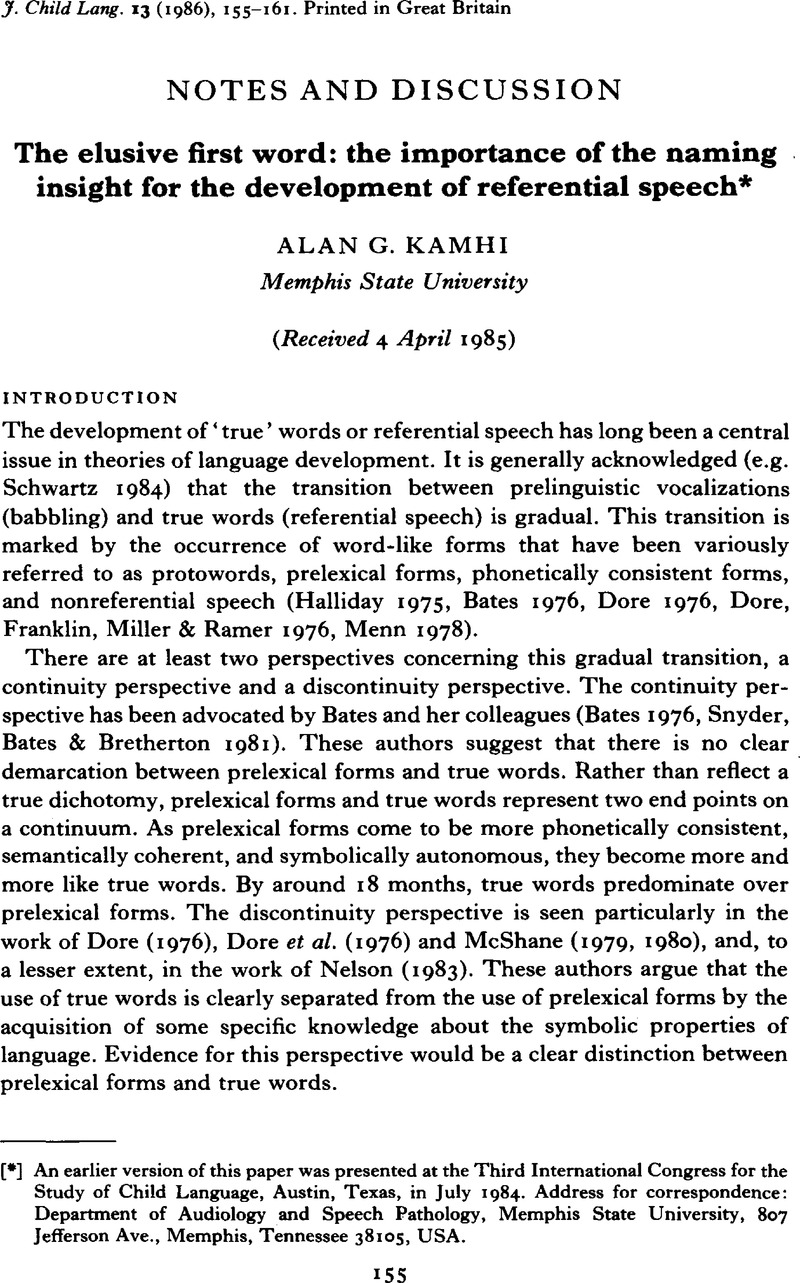Crossref Citations
This article has been cited by the following publications. This list is generated based on data provided by Crossref.
KLAUSEN, TOVE
1988.
Struktur og reorganiseringsprocesser i tidlig ordforrådsudvikling.
Nordisk Psykologi,
Vol. 40,
Issue. 2,
p.
120.
Kamhi, Alan G.
1988.
Three popular myths about language development.
Child Language Teaching and Therapy,
Vol. 4,
Issue. 1,
p.
1.
Harris, Margaret
Barrett, Martyn
Jones, David
and
Brookes, Susan
1988.
Linguistic input and early word meaning.
Journal of Child Language,
Vol. 15,
Issue. 1,
p.
77.
Stoel-Gammon, Carol
1989.
Prespeech and early speech development of two late talkers.
First Language,
Vol. 9,
Issue. 6,
p.
207.
Robb, Michael P.
and
Saxman, John H.
1990.
Syllable Durations of Preword and Early Word Vocalizations.
Journal of Speech, Language, and Hearing Research,
Vol. 33,
Issue. 3,
p.
583.
Ninio, Anat
1993.
On the fringes of the system: children's acquisition of syntactically isolated forms at the onset of speech.
First Language,
Vol. 13,
Issue. 39,
p.
291.
Williams, Tim I.
1993.
Brief report: Vocabulary development in an autistic boy.
Journal of Autism and Developmental Disorders,
Vol. 23,
Issue. 1,
p.
185.
Kostović, Ivica
Judaš, Miloš
Petanjek, Zdravko
and
Šimić, Goran
1995.
Ontogenesis of goal-directed behavior: anatomo-functional considerations.
International Journal of Psychophysiology,
Vol. 19,
Issue. 2,
p.
85.
1996.
The Handbook of Child Language.
p.
691.
Goldfield, Beverly A.
and
Reznick, J. Steven
1996.
Measuring the vocabulary spurt: a reply to Mervis & Bertrand.
Journal of Child Language,
Vol. 23,
Issue. 1,
p.
241.
Molfese, Dennis L.
and
Narter, Dana B.
1997.
Cerebral Asymmetries in Sensory and Perceptual Processing.
Vol. 123,
Issue. ,
p.
325.
Molfese, Dennis L.
1998.
The Other Side of the Error Term - Aging and Development as Model Systems in Cognitive Neuroscience.
Vol. 125,
Issue. ,
p.
107.
Wray, Alison
1999.
Formulaic language in learners and native speakers.
Language Teaching,
Vol. 32,
Issue. 4,
p.
213.
Shanker, Stuart
2001.
What Children Know When They Know What a Name Is.
Current Anthropology,
Vol. 42,
Issue. 4,
p.
481.
McCune, Lorraine
and
Vihman, Marilyn M.
2001.
Early Phonetic and Lexical Development.
Journal of Speech, Language, and Hearing Research,
Vol. 44,
Issue. 3,
p.
670.
Courage, Mary L.
and
Howe, Mark L.
2002.
From infant to child: The dynamics of cognitive change in the second year of life..
Psychological Bulletin,
Vol. 128,
Issue. 2,
p.
250.
Ganger, Jennifer
and
Brent, Michael R.
2004.
Reexamining the Vocabulary Spurt..
Developmental Psychology,
Vol. 40,
Issue. 4,
p.
621.
Schafer, Graham
2005.
Infants Can Learn Decontextualized Words Before Their First Birthday.
Child Development,
Vol. 76,
Issue. 1,
p.
87.
Price, Johanna R.
Pollock, Karen E.
and
Oller, D. Kimbrough
2006.
Speech and language development in six infants adopted from China.
Journal of Multilingual Communication Disorders,
Vol. 4,
Issue. 2,
p.
108.
Fazly, Afsaneh
Alishahi, Afra
and
Stevenson, Suzanne
2010.
A Probabilistic Computational Model of Cross‐Situational Word Learning.
Cognitive Science,
Vol. 34,
Issue. 6,
p.
1017.



